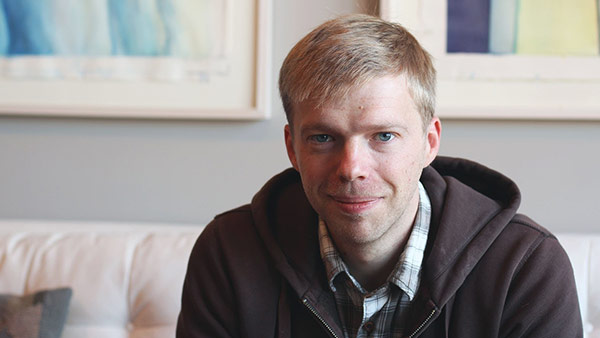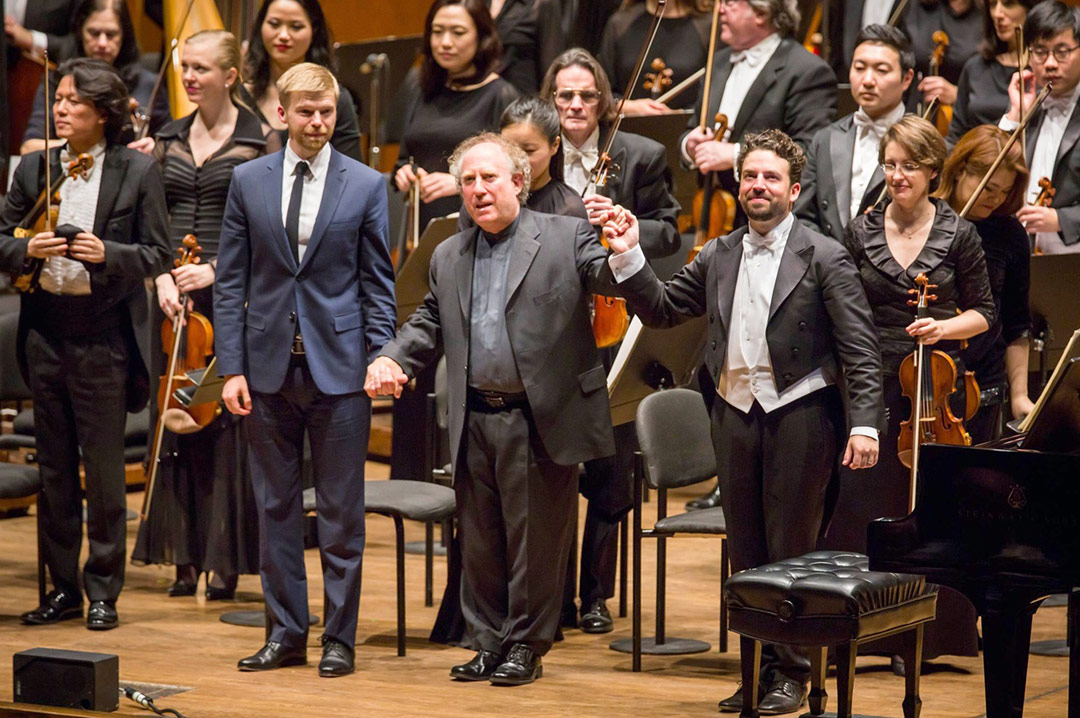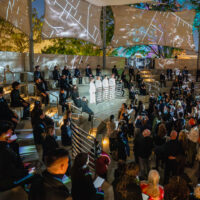
Composer Andrew Norman honored with Guggenheim Fellowship
By Allison Engel

Composer Andrew Norman (Photo by Alexandra Gardner / NewMusicBox)
Andrew Norman (’02, MM ’04), an assistant professor of Composition at the USC Thornton School of Music, has added another international award to his résumé. On April 6, it was announced that he had received a Guggenheim Fellowship for his innovative compositional work. He was one of only 12 composers selected for the honor from the John Simon Guggenheim Memorial Foundation this year, and was recommended for the fellowship by an expert panel of composers who are former Guggenheim fellows.
Norman, 36, already has won the Rome Prize (in 2006) and the Berlin Prize (in 2009). His string trio, The Companion Guide to Rome, was a finalist for the 2012 Pulitzer Prize in Music, and his orchestral work, Play, was nominated for a 2016 Grammy Award. He has had his works performed by major orchestras around the world, including the Los Angeles Philharmonic, the New York Philharmonic, the BBC, St. Louis and Melbourne Symphonies, the Orpheus Chamber Orchestra, the Tonhalle Orchester Zurich, the Orchestre National de France, and the Philadelphia and Minnesota Orchestras, garnering rapturous reviews. He is currently composer in residence with the Los Angeles Chamber Orchestra and Opera Philadelphia.
Norman, who was originally from Grand Rapids, MI but spent his high school years in Modesto, began studying piano at the age of 6, majored in piano and composition at USC Thornton, and has been teaching here for three years.
The Guggenheim grant will allow Norman to take a leave for the 2016-17 academic year to work on two upcoming operas. The first, a co-commission from the Berlin Philharmonic and London Symphony, is a semi-staged opera with several choruses of singers of different ages, from children through adults, both professional and non-professional. The idea of a “community” opera involving non-professionals was suggested to Norman by Simon Rattle, the Berlin Philharmonic’s conductor and London Symphony conductor-designate. England has a tradition of community operas, Norman noted, such as British composer Benjamin Britten’s Noye’s Fludde. Norman said he is working with a librettist and currently searching for the right subject matter with a universal theme. It is scheduled to premiere in Berlin in the summer of 2017 and then travel to London.
“It’s very exciting to have that amount of focused time to work,” he said. “I will miss teaching, but I really do have to get this thing done.” He had planned to request an unpaid leave to work on the piece, but applied for the Guggenheim, and it came at just the right time. It will provide enough money for him to live on for a year, he said.
The second opera he will be working on is a commission from Opera Philadelphia. That project is just getting off the ground, and a subject has yet to be chosen.
Norman has been showered with critical praise for his compositions, some of which are written with open passages that allow musicians to play them in a number of ways, making each performance “different and unpredictable, which I like,” said Norman. His musical influences also are contemporary, ranging from novels to “nonlinear, narrative-scrambling techniques from cinema, television and video games,” he writes on his website.
A 2008 orchestral work, Unstuck, drew inspiration from the fragmentary quality of Kurt Vonnegut’s novel Slaughterhouse-Five, and prompted a reviewer to call the piece “something to behold.”

Andrew Norman, pianist Jeffrey Kahane, and conductor James Gaffigan at the premiere of Norman’s Split with the New York Philharmonic in December. (Photo/Chris Lee)
Last month, the Los Angeles Philharmonic under conductor Gustavo Dudamel premiered his Play: Level 1, adapted from his 2013 orchestral cycle, Play, which echoes the exuberantly frenetic, startling disjointed experience of video game play. Los Angeles Times reviewer Mark Swed wrote: “Think of this being to music what William Burroughs’ cutups were to literature, instead of juxtaposing other people’s work, as Burroughs did, Norman’s bits and pieces are his wacky own. But give yourself over to it and you emerge from a nerve-racking but fabulously exhilarating ride.”
Last December, a concerto Norman composed especially for pianist Jeffrey Kahane (a USC Thornton colleague), had a world premiere with the New York Philharmonic at Lincoln Center. Split was described as invoking “a world of fluid and fragmentary relationships, fueled by group chats and Facebook threads.”
The New York Times’ primary classical critic Anthony Tommasini gave Norman a printed bouquet: “Mr. Norman brings to his work an acute ear for sonority, along with a sure feel for musical architecture. During every teeming, discombobulating moment of ‘Split,’ you sense a composer in control.” Tommasini began his review by asking: “Can the young composer Andrew Norman keep this up?”
The answer, given this month by the Guggenheim Foundation, is a resounding “yes.”
The Guggenheim Fellowship was established in 1925 by U.S. Senator and Mrs. Simon Guggenheim as a memorial to their son John to “add to the educational, literary, artistic, and scientific power of this country, and also to provide for the cause of better international understanding.” The foundation awards approximately 200 fellowships each year to “men and women who have already demonstrated exceptional capacity for productive scholarship or exceptional creative ability in the arts.”
This year, 178 scholars, artists and scientists from the United States and Canada were selected from nearly 3,000 applicants.

